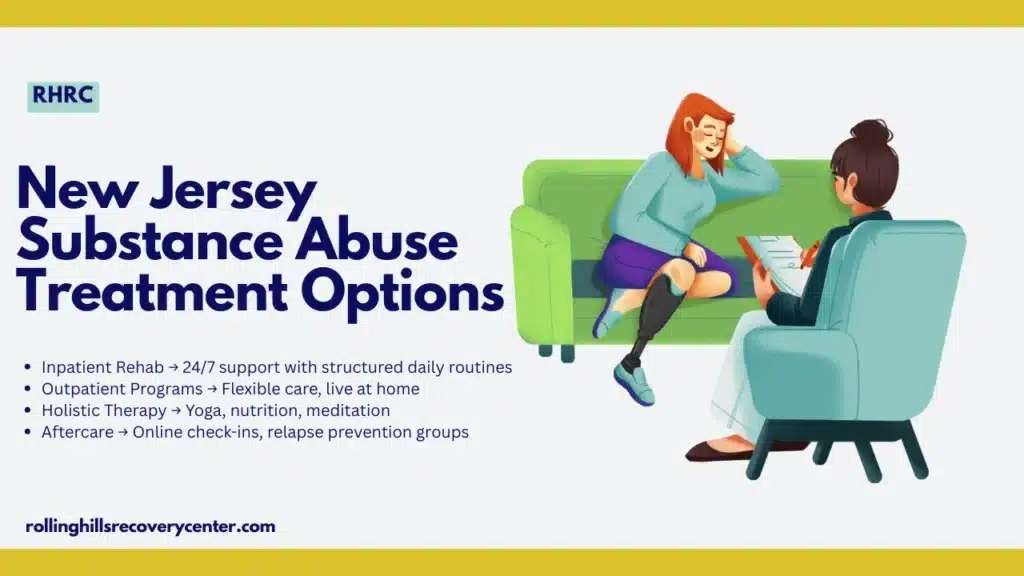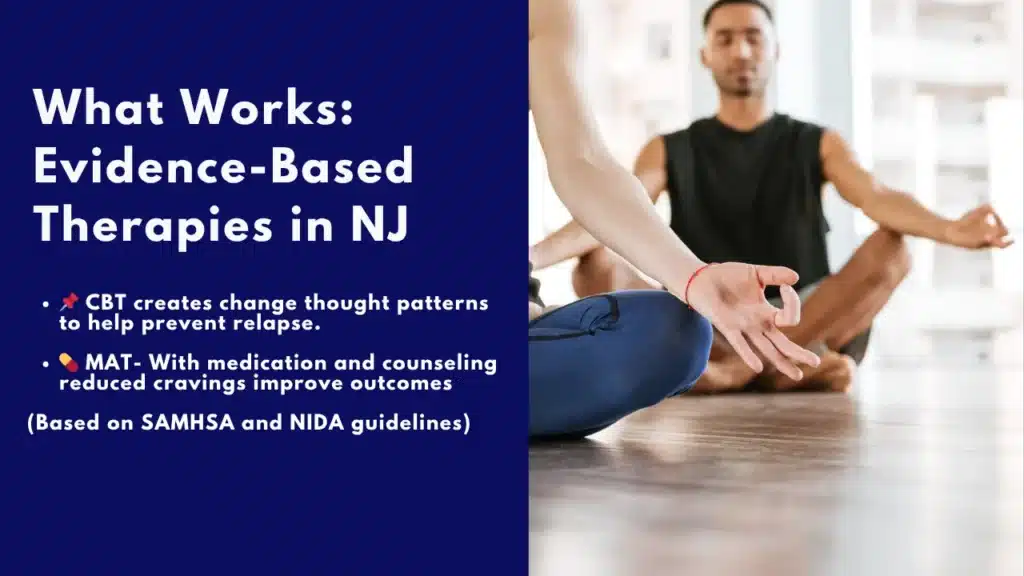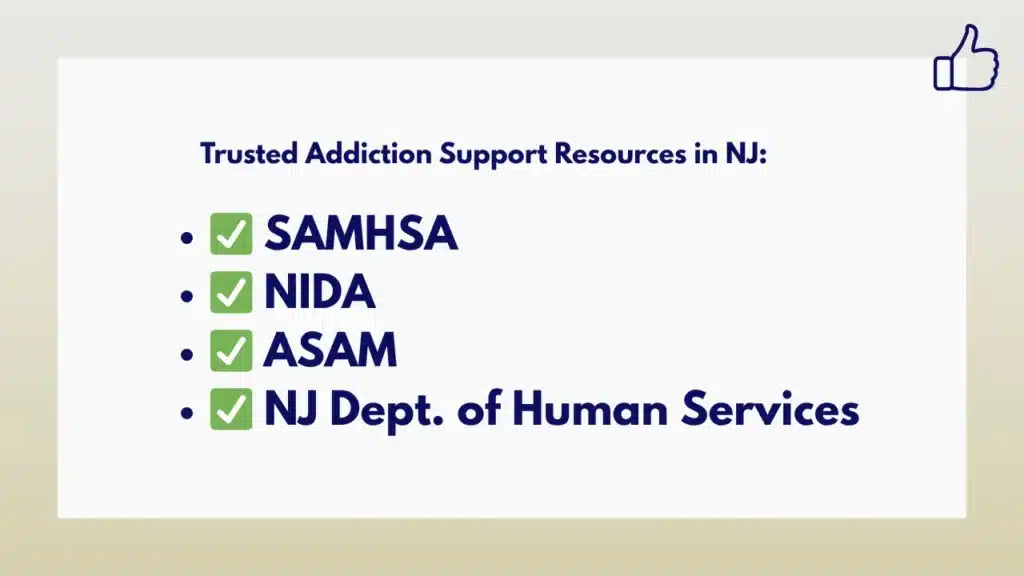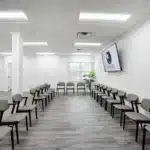New Jersey has seen growing challenges in substance abuse treatment, and available programs try to offer both traditional and holistic ways.
Many centers provide practical help, support groups, and insurance advice, while community initiatives and local agencies show genuine care.
The state has a mix of inpatient and outpatient approaches that reflect a real commitment to recovery.
Key Takeaways
- New Jersey has a wide range of options for substance abuse treatment, including both inpatient and outpatient programs, tailored to meet individual needs.
- Many centers in New Jersey combine holistic methods with traditional care, offering therapies that promote overall well-being and support recovery.
- Community support in New Jersey is vital, with local programs and agencies aiding in addiction recovery and providing essential resources for individuals.
- Understanding your insurance options can ease the financial burden of treatment; be sure to explore coverage with your provider and talk to treatment centers about possible assistance.
Introduction to New Jersey Substance Abuse Treatment
New Jersey has a unique landscape when it comes to substance abuse treatment. The state faces its own challenges, from high urban density in areas like Newark and Jersey City to more rural communities grappling with isolation and limited resources.
The local population deals with differing social dynamics, economic challenges, and cultural influences that affect the patterns of drug and alcohol use. This diversity within the state means treatment programs need to be flexible and innovative.
Substance abuse is not a one-size-fits-all challenge. In New Jersey, professionals blend evidence-based treatment with a holistic approach to help those struggling with addiction.
Centers like Rolling Hills Recovery Center, known for being an experienced rehab facility, focus on both the scientific and emotional aspects of recovery. Their evidence-based addiction treatment can be the key to unlocking lasting change and a healthier future.
Treatment Programs in New Jersey

Addiction treatment programs in New Jersey offer a range of options tailored to meet individual needs. The primary categories include inpatient and outpatient care, but there are also holistic approaches and aftercare support options that provide a continuous safety net.
“A good substance abuse clinic doesn’t just offer a bed, it matches level of care to relapse risk, co-occurring mental health, and family needs. That’s what keeps people in treatment.”
Mike Levy | Executive Director at Rolling Hills Recovery Center
Inpatient Care Options
Inpatient substance abuse treatment provides a controlled environment where patients can focus solely on recovery without outside distractions. New Jersey boasts programs that offer medically supervised detoxification, therapy sessions, and structured daily routines. Benefits include:
- 24/7 supervision and immediate assistance
- Access to comprehensive therapies
- A structured environment that limits exposure to triggers
Inpatient rehab is highly recommended for those with severe addiction or co-occurring mental health disorders.
Outpatient Care Options
Outpatient programs allow individuals to receive treatment while continuing to live at home, maintaining some daily responsibilities. This format works well for those with less severe substance abuse problems or those with strong support systems at home. Key aspects include:
- Flexibility in scheduling therapy sessions
- Continued work or school commitments without interruption
- The ability to apply learned skills in real-life environments
Step-by-step instructions in outpatient settings often conclude with a carefully planned schedule for therapy sessions and group meetings, ensuring that clients stay on track.
Holistic Approaches and Aftercare Support

Many New Jersey centers are integrating holistic methods such as yoga, meditation, and nutritional counseling into treatment plans. These strategies complement traditional treatment by addressing the whole person:
- Meditative practices to reduce stress and anxiety
- Nutritional support to repair body systems affected by substance abuse
- Art and music therapy sessions to stimulate creativity and emotional healing
Aftercare support is equally crucial. Programs offer ongoing counseling, relapse prevention strategies, and community support groups. Resources include:
- Regular check-ins via online tools
- Neighborhood groups that provide peer support
- Follow-up calls from case managers to ensure progress

Effective Therapies in Substance Abuse Treatment
Modern treatment methods in New Jersey frequently incorporate evidence-based therapies to support recovery. Two of the most impactful are cognitive behavioral therapy (CBT) and medication-assisted treatment (MAT).
Cognitive Behavioral Therapy (CBT)
CBT is a form of talk therapy that helps individuals change their thought patterns, addressing the unrealistic beliefs and behaviors that contribute to addiction. In New Jersey, therapists use CBT to help clients:
- Identify and reframe negative thought cycles
- Develop healthier coping mechanisms when faced with triggers
- Build strategies for long-term resilience against relapse
A step-by-step guide in a CBT session might include first recognizing negative patterns, then learning techniques to counteract those behaviors, and finally applying these lessons in everyday situations.
Medication-Assisted Treatment (MAT)
MAT combines medications with counseling and behavioral therapies. It’s effective in treating substance use disorders for opiates, alcohol, and other addictions. MAT works by:
- Stabilizing brain chemistry to prevent relapse
- Reducing withdrawal symptoms
- Lowering the chance of dangerous cravings
Medication-assisted treatment is more than just taking medicine; it involves frequent check-ins and therapy sessions to monitor progress. For individuals who are new to recovery or working with high-risk substances, MAT provides a safe bridge to longer-term treatment plans.
Emerging Technologies in Rehab
New Jersey’s treatment centers are not locked in traditional methods. Emerging technologies play a growing role in addiction recovery, extending the reach of professionals. These include:
- Virtual counseling platforms that offer remote therapy sessions
- Mobile applications designed for tracking sobriety and managing triggers
- Telemedicine that connects rural patients with top-tier specialists in urban centers
Technology is enhancing patient engagement by providing useful tools and templates for relapse prevention plans. These tools often include step-by-step guides, interactive checklists, and even reminder alerts that help clients stick to their recovery schedules.
Local Support Resources and Community Initiatives

New Jersey is home to numerous support resources tailored to diverse needs. A mix of state agencies, non-profit groups, and community organizations work alongside trusted agencies to ensure comprehensive care.
Trusted Agencies and State Resources
Local agencies, such as the NJ Department of Human Services, work closely with centers like Rolling Hills Recovery Center to provide state-funded treatment for those who need it. These partners aim to ensure that quality care is accessible to all residents regardless of their economic background.
Some well-known agencies in the field include:
- SAMHSA: Offers a nationwide locator for local treatment programs and resources.
- NIDA: Provides research and education on drug abuse and addiction.
- ASAM: Delivers clinical guidelines and support for substance abuse treatment decisions.
Community initiatives also play a key role. Local groups often organize support meetings and educational seminars to spread awareness about addiction. These initiatives provide free or low-cost resources and group therapy sessions, which have proven essential in creating a supportive environment for recovery.
Funding and Insurance Insights
Understanding the financial aspects of treatment can feel overwhelming. However, New Jersey offers several paths to cover the cost of rehabilitation programs. Insightful approaches include:
- Applying for state-funded programs if you qualify
- Checking with your insurance provider for mental health and addiction recovery benefits
- Exploring grants and financial aid options that are available through local community centers
A simple method to get started is by making a list of potential treatment centers and then contacting them to ask about financial assistance programs. For many, the first step is filling in an application form that asks for proof of income and documentation of past treatment, if any.
Community Reviews and Internal Resources
Local patients and families often share their experiences through testimonials and online reviews, offering guidance on what to expect from treatment centers. For example:
- Those seeking recovery support can find personal narratives on “Are drugs and alcohol making life unmanageable?”
- Individuals who are starting their road to recovery can also explore experiences shared regarding treatment hurdles in “I want to stop using dugs and alcohol but i cant.”
These internal links serve as valuable tools for those in need of clear, methodical advice based on real-life experiences. They are a reminder that while the journey may be complex, accessible resources and patient guides are available to help navigate each step.
The Role of Evidence-Based Practices
Evidence-based practices are fundamental in ensuring that treatment programs work effectively. Centers like Rolling Hills Recovery Center rely on scientific research and clinical guidelines to build a solid foundation for their programs. Evidence-based practices involve:
- Analyzing patient outcomes to determine which therapies work best in long-term sobriety
- Adjusting treatment plans based on state-of-the-art research and best practices from leading health organizations
- Using data and statistics to refine techniques and ensure that patients receive the most effective care possible
Understanding the basics of these methods can be useful if you are looking for how-to steps to manage your own treatment plan. For instance, a typical process involves:
- Initial assessment of the patient’s history and needs
- Developing a personalized treatment plan with clear, measurable goals
- Conducting regular progress assessments to adjust the plan as needed
Emerging Trends and Research Developments

The field of substance abuse treatment is continuously evolving. Research and new technologies are shaping the future of addiction treatment both in New Jersey and nationwide.
Advancements in Treatment Techniques
New research shows that integration of technology with traditional treatment methods can improve patient outcomes. For example:
- Virtual reality (VR) is starting to be used for exposure therapy and for simulating challenging situations in a controlled environment.
- Mobile apps offer daily check-ins and reminders that help patients maintain their schedules and record cravings or triggers.
- Wearable devices are being tested to track vital signs and stress levels, alerting professionals if a patient appears to be at risk of relapse.
Innovations in Holistic Methods
Holistic medicine continues to evolve, with increasing acceptance among treatment centers. New approaches include:
- Mindfulness-based stress reduction programs developed specifically for addiction recovery
- Nutritional plans designed to rebuild the body’s strength and repair damage from long-term substance use
- Integrated care models where physical and mental health are treated simultaneously, rather than in isolation
Data-Driven Decision Making
The use of big data has begun to influence how treatment centers measure success. Programs incorporate patient feedback, treatment duration, and relapse rates to fine-tune their approaches better. This data-driven approach helps labs and clinicians to:
- Identify which programs are most effective for specific demographics
- Adapt quickly to changing trends in substance abuse behavior
- Ensure that funding and insurance align with best practices and measurable outcomes
Integrating Community Initiatives and Personal Recovery Journeys
A strong sense of community support is at the heart of New Jersey’s substance abuse treatment landscape. Local initiatives often provide a bridge between clinical treatment and the everyday realities of living in recovery. Community programs offer:
- Peer support groups moderated by trained professionals
- Educational workshops on relapse prevention
- Family counseling sessions where loved ones learn strategies to support ongoing recovery
Tools and Templates for Recovery Success
Many centers provide step-by-step guides and templates that help individuals navigate their recovery journey. Useful tools include:
- Daily mood trackers that allow patients to log their emotional state and triggers
- Checklists for relapse prevention that detail actionable steps to take when encountering high-risk situations
- Guided journal templates that encourage reflection and tracking of progress throughout the recovery process
Following these templates can be a central element of sustaining recovery. For instance, a typical daily mental wellness routine might include:
- Morning meditation or yoga practice
- Listing three daily goals related to personal recovery
- Evening reflection with a journal entry summarizing successes and lessons learned
These tools provide a structured yet flexible framework that helps maintain focus during the challenging early stages of recovery. They serve as both a roadmap and a personal journal that adapts with the individual.
Funding, Insurance and Accessing Treatment
Securing funding and understanding how insurance works for rehab is an important part of accessing treatment. New Jersey offers multiple pathways to support treatment costs, including private insurance, Medicaid, and state-funded programs.
Key steps in finding funding include:
- Researching eligibility for state or federal assistance programs
- Speaking with a case manager at treatment facilities to understand available financial aid packages
- Comparing insurance policies to see which providers cover specialized therapies like MAT or holistic care
Simple checklists can help ensure nothing is overlooked:
- Verify coverage details with your insurance provider
- Prepare necessary documentation like income statements or previous medical records
- Ask about sliding scale fees and any available grants for addiction treatment
These checks simplify what can be an overwhelming process, ensuring that individuals can concentrate on recovery rather than administrative hurdles.
Future Trends in New Jersey Substance Abuse Treatment
The future of substance abuse treatment in New Jersey looks promising as research, technology, and community-based approaches continue to evolve. Future trends likely include:
- More personalized treatment plans using genetic and behavioral data for tailored recovery approaches
- Expanded use of telehealth platforms, making high-quality treatment accessible to rural areas
- Greater integration of mental health and addiction services under one roof, ensuring comprehensive care for patients
Ongoing collaboration between local centers, educational institutes, and state-funded research facilities promises innovative solutions that will keep getting better. Professionals are exploring new methods regularly, and the hope is that these efforts will lead to lower relapse rates and better long-term outcomes.
New Jersey is leading the way in many respects, setting an example for how local and state-level initiatives can work hand in hand to improve recovery pathways. These trends are supported by ongoing studies and community feedback, ensuring that as challenges evolve, so do the solutions provided.
Rolling Hills Recovery Center stands out as a facility of excellence in this innovative environment. Their approach, combining holistic care with proven, evidence-based treatment, provides a solid foundation for future success.
The integration of digital tools, community support, and comprehensive care has cemented New Jersey’s reputation as a stronghold for innovative substance abuse treatment. Access to state-of-the-art therapy, combined with personalized care and new technologies, offers hope to those struggling with addiction that lasting recovery is possible.
This landscape is not static; rather, it changes as new research, funding opportunities, and community initiatives emerge. Providers are continually updating their methods, adhering to modern guidelines, and incorporating fresh insights from reputable sources such as SAMHSA, NIDA, and ASAM.
By following these structured steps, examining comparative programs, and leveraging innovative tools, individuals in New Jersey can make well-informed decisions about their recovery journey and build a sustainable path towards healing and growth.
Conclusion
This article recapped New Jersey’s diverse recovery options, showing that a mix of evidence-based and holistic methods can help individuals. Key insights include the role of community support, tailored treatment plans, and insurance navigation. If you or a loved one is interested in beginning treatment, reach out to Rolling Hill Recovery Center or verify your benefits online today.
Frequently Asked Questions (FAQs)
What Treatment Options Are Available for Recovery in New Jersey?
There are many treatment options available for recovery in New Jersey, ranging from traditional residential programs to outpatient care.
People can choose evidence-based treatments, 12-step programs, and even holistic approaches that focus on mind and body healing.
Some centers even offer alternative therapies like art or music therapy, which can complement standard methods and make treatment feel more personalized.
How Do I Know if I'm Ready to Start Recovery Treatment?
Figuring out if you're ready to start recovery treatment can be tough, but a good sign is when you feel that change is needed.
This might show up as unusual stress, trouble coping, or strained relationships. Many communities in New Jersey offer free assessments through local health centers or even suicide hotlines.
Sometimes talking with a trusted friend or mental health professional can help you decide.
What Holistic Approaches Are Integrated in New Jersey Recovery Options?
Holistic approaches in recovery usually include therapies that address both the mind and the body.
In New Jersey, some programs combine diet, exercise, mindfulness, and counseling with traditional drug or alcohol treatment.
These methods help many people feel more balanced and improve overall well-being. They are not meant to replace evidence-based treatments but rather to complement them, giving patients a rounded healing process.
How Can Insurance Help Cover Treatment Costs in New Jersey Recovery Programs?
Insurance can often help carry some of the expense of recovery treatments. Many New Jersey programs work with insurance companies to ease the burden and make care more available.
It's common practice now to contact your provider for a list of approved treatment centers and ask about coverage options.
This process might seem confusing at first, but speaking directly with a treatment center’s insurance coordinator can simplify things quite a bit.
Author
-
Our editorial team includes licensed clinicians and board-certified addiction specialists. Every article is written and reviewed to be clear, accurate, and rooted in real treatment experience.
View all posts -
Dr. Williams has held senior leadership positions in the behavioral health field for over 30 years. He has worked with diverse populations in various private and public sectors.
View all posts












